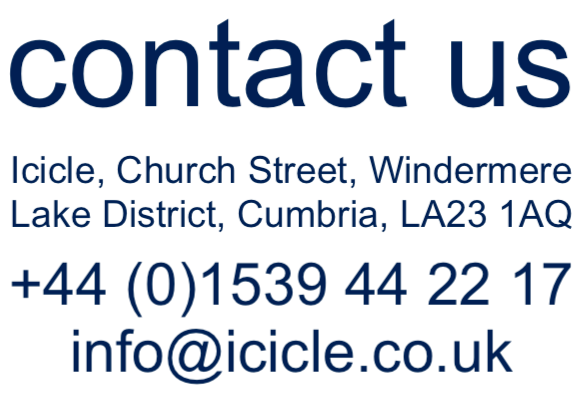Selecting
an Alpine guide & what qualifications to look
for


 |
 |
Knowing
what qualifications are required is a bewildering
minefield for clients. You can technically
be guided to the summit of Everest by someone
with no qualification, whilst trail running
in the Alps is highly regulated with all leaders
carrying Carte Professionelle and carnets.
In the UK there's also no legal requirement
for qualification. Here we unpick all the
jargon, and outline how we rise to the standard,
and often better it. |
 |
  In
the Alps the highest qualification
that is recognised for leading groups
in the glaciated terrain of the high
mountains is the IFMGA Mountain Guide, and
they are the only people who lead
any of our skiing or climbing courses
in the Alps. IFMGA stands for the International
Federation of Mountain Guide Associations. In
the Alps the highest qualification
that is recognised for leading groups
in the glaciated terrain of the high
mountains is the IFMGA Mountain Guide, and
they are the only people who lead
any of our skiing or climbing courses
in the Alps. IFMGA stands for the International
Federation of Mountain Guide Associations.

  All
our IFMGA Guides hold the International
Mountain Guide carnet (use of IFMGA
logo authorised by named course directors),
and have been selected for their leadership
style, personality, and sense of humour,
not to mention the fact that they
aren’t too bad at climbing and
skiing either! All
our IFMGA Guides hold the International
Mountain Guide carnet (use of IFMGA
logo authorised by named course directors),
and have been selected for their leadership
style, personality, and sense of humour,
not to mention the fact that they
aren’t too bad at climbing and
skiing either! |
|
|
 |
  Alpine
trekking / trail running / snowshoeing
courses are run by UIMLA International
Mountain Leaders (use
of UIMLA logo authorised by named
course directors below).
These instructors also run a lot of
our avalanche awareness courses. Our
itineraries are planned with guide
to client ratios within the guidelines
of the IFMGA and UIMLA. Alpine
trekking / trail running / snowshoeing
courses are run by UIMLA International
Mountain Leaders (use
of UIMLA logo authorised by named
course directors below).
These instructors also run a lot of
our avalanche awareness courses. Our
itineraries are planned with guide
to client ratios within the guidelines
of the IFMGA and UIMLA.

  Each course itinerary states these
daily guiding ratios. These two qualifications
are your guarantee of the highest
standards and professionalism, and
the holders of these qualifications
wear their badges with pride. Rest
assured that you are being led in
the mountains by the best. Each course itinerary states these
daily guiding ratios. These two qualifications
are your guarantee of the highest
standards and professionalism, and
the holders of these qualifications
wear their badges with pride. Rest
assured that you are being led in
the mountains by the best. |
|
|
 |
We
strongly believe that a badge or qualification
does not make a good leader, which is why
we carefully hand pick our guiding team. However
you have our guarantee that all our courses
are led by verified highly qualified professionals,
as this is a legal requirement in the Alps. |
 |
Elsewhere
on the internet you will find disillusioned
individuals stating that the qualification
is everything, yet nothing could be further
from the truth. You all remember good and
bad teachers from school, and they all had
the same qualification. We avoid narcissism,
and focus on personality. |
|
|
|
|
 |
As
a reputable leading guiding outfit, we see
it as part of our greater social responsibility
to help market and explain the various qualifications,
some of which we do not even use, as they
are not valid in the Alps. |
 |
The
qualifications of different mountain instructors
may at first seem bewildering to someone new
to the sport, especially all the differences
between the UK and the Alps, but this page
sets out to explain them. |
 |
All
the information below is summarised from the
UK Mountain Leader Training website (www.mltuk.org)
website, for your ease of reference. To read
more about the qualifications, click on the
link above. |
 |
The
table below, outlines the key differences, selection,
assessment, responsibilities, and limits imposed
on the different levels of instructor, and
ranks the qualifications from lowest to highest. |
|
 |
 |
Single
Pitch Award
This qualification
is only valid in the UK only, and is for one
pitch climbs only. It is often used by as
the key award for climbing wall staff. As
well as previous experience, it involves one
weekend training, and 2 days assessment. |
Walking
Group Leader
This qualification
is only valid in the UK only, and is designed
to teach navigation and group management skills
for a person leading groups in non-mountainous
terrain (e.g. Dartmoor). No steep ground can
be crossed. |
Summer
Mountain Leader ML
This qualification
is only valid in the UK only, and is the mountain
version of the WGL. In addition it covers
group security on steep ground. It involves
extensive previous experience, 1 week training,
and 1 week assessment of which a 3 day expedition
element is a key element. |
Winter
Mountain Leader MLW
This qualification
is only valid in the UK only, and is the winter
version of the Summer Mountain Leader award.
The use of crampons and ice axe is necessary,
and further winter experience is required
before a 1 week training, and a 1 week assessment
with a 3 day expedition involving snowholes. |
Mountain
Instructor Award MIA
This qualification
is only valid in the UK only, and is limited
to the leading of groups on multipitch rock
climbing and for hillwalking in summer conditions.
All holders of the MIA become members of the
Association of Mountaineering Instructors
(AMI). Rate of pay is c.£180 per day. |
Mountain
Instructors Certificate MIC
This certificate
covers all activities included in the MIA,
and also covers UK winter mountaineering and
climbing, and winter hillwalking. All MIC
qualification holders are also members of
the Association of Mountaineering Instructors.
Neither MIA's or MIC's can work in the Alps.
Rate of pay is c.£120 per day. |
Trainee
Mountain Guides
These are people
who have enrolled on a Mountain Guide training
scheme. In addition they have passed the first
test in the training scheme which is the rock
test. At this stage they can Guide independantly
in their own country on rock climbs, equivalent to the MIA award. Rate of pay is c.£180 per day. |
Aspirant
Mountain Guides
After completing
the trainee stage, and passing several more
tests, a future Guide gains the Aspirant status.
In the Alpine countries, Aspirant Guides can
work alongside senior fully qualified mountain
guides, but within tight guidelines as to
the grade and altitude. Pay is c.£250
per day. |
International
Mountain Leader
To lead trekking, trail
running, or snowshoeing groups in the Alps,
it is a legal requirement to be qualified
as an International Mountain Leader (IML).
To gain this award, you require your ML award,
significant international trekking experience,
and then three weeks of training and assessment
in the Alps, both in summer and in winter.
Some of the training specialises in avalanche
awareness, altitude sickness, the environment,
and physiology. This award does not involve
any climbing. Holders of this award hold a
UIMLA carnet and that of their own country
(e.g. British Association of International
Mountain Leaders, BAIML). In the French speaking
parts of the Alps IML's are often refered
to as Accompagnateurs or Mid Mountain Guides.
Only the IML and IFMGA Mountain Guide schemes
hold carnets. Rate of pay is c.£200
per day. |
International
Mountain Guide
This qualification is
the highest possible in the mountaineering
world, and whilst the qualification is enforced
as a strict legal requirement in the Alps,
many leaders choose to train to this standard
to lead groups in other corners of the world,
to offer a good guarantee of providing the
highest levels of professional and safety
standards. Any full Guide can lead groups
for rock climbing, off piste, mountaineering,
ice climbing, anywhere in the world. In addition
there is no maximum grade that they are restricted
to. The majority of the countries with IFMGA
(International Federation of Mountain Guide
Associations) bodies are in the Alps and Europe,
and there are seventeen member associations
globally. In addition to the IFMGA carnet,
holders may also use the logo of their nations
association. The rate of pay is c.£300
per day. |
|
|
|
 |
| About
the Icicle guiding team & key safety policies |
 |
 |
Icicle
only uses Aspirant and full Mountain Guides
to lead all the climbing and skiing Alpine
courses, and International Mountain Leaders
for trekking, trail running or snowshoeing
elements of courses. |
 |
In
addition to their guiding qualifications,
many of our team hold other key qualifications
such as being ski instructors or personal
trainers, and we firmly believe that these
extra skills really add to the quality of
guiding. The extra experience all leaders
have, in part comes from the rigourous CPD
that all qualified IFMGA and UIMLA guides
go through both via formal 'recyclage' and
independently selected CPD. |
 |
On
each week we generally have a head guide,
supported by a number of other guides. Whilst
we may know the pool of guides selected for
a week, the specific guide leading each person
is not decided until the week or even day,
as a factor of the guides preference, current
conditions, and client performance. Guides
may even change during a week in case of force
majeur, injury, or even fatigue (highly unlikely!). |
 |
If
there are less than the maximum numbers, you
benefit from better guiding ratios. If you
have been on a course before, and have a favourite
Guide, you can request that they guide you
during your next course. |
 |
We
have a regular team of over 40 mountain guides
and leaders, details of whom you can see published
on the guides
& staff page of the website. Some
are very good teachers (great for Intro level
courses), whilst others are inspirational
leaders on hard climbs (for advanced level
courses). |
 |
We
are incredibly lucky to have some very good
all rounders working for Icicle. One
of our key strengths is that we are never
going to be complacent about our team, and
will evolve with the times. |
 |
Team
flexiblity gives Icicle a great advantage
over other operators with a static approach,
or groups of guides trying to market themselves
as a company, and we urge any potential client
to consider this point carefully. |
 |
Flexibility
gives our courses great versatility, and a
far better product than independant guides
can offer. You need to consider this point
very carefully when choosing an operator,
as it could affect your summiting chances. |
 |
We
check out the qualifications of all the Guides
and instructors working for us. This is done
in three ways, firstly we confirm if the Guide
is listed on the published lists of the BMG
/ BAIML / SNGM / UIMLA, secondly we check
the carnet (qualification card) of the Guide
and its insurance date stamp, and thirdly
we scan the carte professionelle (for Alpine
courses) to ensure they are registered for
local compliance. |
 |
On
many routes and activities there are recommended
guiding ratio limits, such as 1:1 for the
Matterhorn or 1:6 for glacier travel. We always
adhere to these limits and often are far below
them. For
example on Gran Paradiso 4061m, a Guide could
take up to six clients, but how fun would
it be if you were at the back? We limit our
ratios to generally 1:3 for this type of ascent. |
|
 |
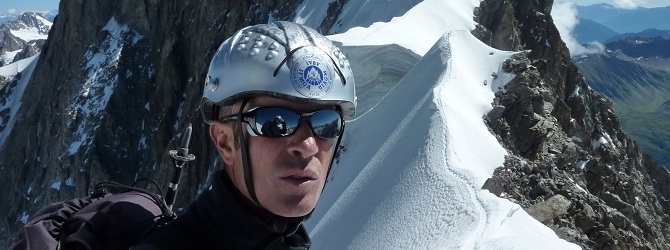 |
 |
 |
 |
 |
How
do you select a guide team?

|

Personal
recommendation, climbing with
them, experience, personality
and style. We use over forty IFMGA Mountain
Guides and UIMLA Leaders, some
of which are featured in the section
above. We carefully match the
guides to each course, so that
their skills are optimised. Icicle
guides are chosen for their drive,
experience, knowledge, and professionalism.
We believe that your guide, as
much as the route, enhances your
experience.
 |
|
|
 |
 |

Are
there international differences?

|

No,
the IFMGA and UIMLA qualifications
are international, and so you
can rest assured that a guides
from any country have been tested
to the same highly rigourous standards.
The IFMGA member countries include
the UK, France, Germany, Holland,
New Zealand, Norway, Italy, and
the USA. UIMLA
member countries include Andorra,
Belgium, France, Great Britain,
Italy, Poland, Spain and Switzerland.
We verify every single one of
our guides qualifications annualy.
 |
|
|
 |
 |

What
are British guide associations?

|

The
UK association of the IFMGA are
the British Mountain Guides or
BMG, and of UIMLA the British
Association of International Mountain
Leaders or BAIML. The IFMGA and
UIMLA ensure that each country
branch qualifies guides of an
internationally agreed standard.
It often takes guides over five
years to qualify.
 |
|
|
 |
 |

What
differs IFMGA and UIMLA?

|

IFMGA guides can lead groups on
glacial terrain, climbing or skiing,
while UIMLA guides lead groups
on moderate mid-mountain terrain,
either trekking or snowshoeing.
 |
|
|
 |
 |
|
|
Does
everyone speak English?

|

Yes,
both English and French / Italian
is spoken by all our guides working
in the Alps. Both are essential
for the Alpine courses, as the
guides can speak French / Italian
fluently to tell the hut guardians
of any requirements you have,
to get advice from other guides
on the conditions they encountered,
and to get you onto cable cars
quickly (often avoiding queues).
 |
|
|
 |
 |

How
is English fluency assessed?

|

Speaking
fluent English is a tested element
of the French and Italian guide
schemes, as it is seen as the
international rescue language.
All the guides who don't speak
English as their first language,
are vetted for their communication
skills and vocabulary. Similarly,
all guides with a language other
than French as their first language
are vetted for their extensive
ability and knowledge of French
/ Italian and English.
 |
|
|
 |
 |

Do
most guides live in the Alps?

|

The
vast majority of our guides are
local residents, as they know
the area and the current conditions
better than those guides who visit
the region from other areas to
work for a week here and there.
This doesn't mean they are all
French - far from it - there is
a good mixture of British, French,
Italian, American, Canadian, Argentinian
and even Slovakian guides working
with us, to name but a few.
 |
|
|
 |
 |

How
do you become a guide?

|

There
are many stages and different
approaches to becoming either
a IFMGA or UIMLA guide, depending
on which scheme. If you want further
information on these processes, click
here.
 |
|
|
 |
 |
|
|
|
 |
Expedition
guides & ethics


 |
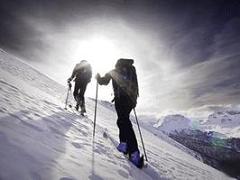 |
 |
| Outside
the Alps, the qualification of guides is less
strictly legally regulated, and so standards
do vary from area to area. We always aim to
match or better the local standard, and each
course itinerary will outline the level of
guide that leads the trip. Local laws are
always followed, for example on Kilimanjaro
where locally registered guides must be used.
On trips where we consider local standards
need to be improved to offer a better level
of safety and support, such as on all of our
Aconcagua trips which are all led by IFMGA
guides. Other trips, such as Elbrus, are led
by local guides in line with the local custom,
as the mountains are less technical in their
nature or they are at a far lower altitude. |
 |
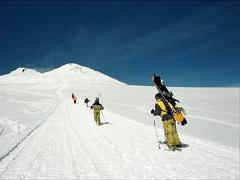 |
 |
| Many
of our trips are to destinations in remote
mountain areas, within under-developed countries,
where events are less predictable than is
usually the case in, for example, Western
Europe or North America. Whilst every effort
will be made to adhere to the planned itinerary,
it must be realised that in this type of adventurous
travel, changes to the itinerary may occur
for which Icicle accepts no responsibility,
however caused. We will make every effort
to inform you of any change, if we know of
any change before departure. Your final itinerary
may differ in respect of the places where
you stay overnight. In particular it may be
necessary to alter your itinerary at short
notice due to adverse weather, force majeure,
mountain conditions, client or leader illness,
road conditions, or to operating conditions
imposed by owners and operators of accommodation,
facilities, aircraft, vessels and other forms
of transport. Should such conditions involve
clients in extra costs such as accommodation,
transportation and meals, such costs are borne
by the client. |
 |
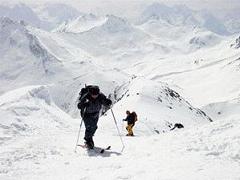 |
 |
| Local
guides possess the detailed local knowledge
we need to achieve our goals and support our
teams. Local guides are not 'guiding' or qualified
in the same stringent way as IFMGA International
Mountain Guides, but work in a far more traditional
sense as route finders and assistants to our
expedition members. We encourage our groups
to work as teams, helping to support and assist
each other throughout the duration of the
expedition. On an expedition you should ensure that you
carry your full travel paperwork, permits,
passports and visas with you at all times
to ensure there are no avoidable delays or
changes. With adventure travel, the unexpected
is the norm in these areas and, despite painstaking
planning and organisation, our adventure holidays
can never be taken for granted like regular
holidays. Many of the places that we visit
do not have the same quality of emergency
health and safety services that we are used
to in the developed world. Internal flights
can be cancelled, road transport is generally
uncomfortable and unreliable, and hotels and
any star ratings often do not approach the
equivalent standards of the West. If you are
not prepared for this, you should not travel
with us. |
 |
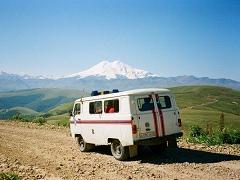 |
 |
| The unpredictability of adventure travel also
means that the itineraries that we put forward
for each of our holidays should be seen as
statements of intent, rather than contractual
obligations. A variety of factors, including
weather, transport difficulties and political
instability, might dictate that we change
any itinerary. The trip leader will make any
changes that are necessary. Only rarely will
such changes be significant, and we will always
do everything within our powers to minimise
the effects of the enforced changes. We cannot
be held responsible for the results of changes
or delays, irrespective of how they are caused. |
 |
|
| Pitfalls
to look out for... |
 |
 |
  Ski
instructors - Qualifications such as
BASI are great, but they cannot lead on glaciated
ski terrain. Consequently we only use IFMGA ski
guides on our off piste and ski touring trips. Ski
instructors - Qualifications such as
BASI are great, but they cannot lead on glaciated
ski terrain. Consequently we only use IFMGA ski
guides on our off piste and ski touring trips.

  Running
coaches - Tickets such as FLiRF / FCiRF
/ REPS etc, have no legal standing or equivalence
in the Alps. Trips must be exclusively led by a
UIMLA guide. Watch out for 'celebrity' runners who
are 'accompanied' by a guide. Either the UIMLA guide
is leading it, or the named runner needs to be fully
qualified themselves. Running
coaches - Tickets such as FLiRF / FCiRF
/ REPS etc, have no legal standing or equivalence
in the Alps. Trips must be exclusively led by a
UIMLA guide. Watch out for 'celebrity' runners who
are 'accompanied' by a guide. Either the UIMLA guide
is leading it, or the named runner needs to be fully
qualified themselves.

  Consolidators - Some companies advertise others trips, and pool
the clients with a leader. Generally these trips
are not specific about the qualification of the
leader. If in doubt, don't book it. Consolidators - Some companies advertise others trips, and pool
the clients with a leader. Generally these trips
are not specific about the qualification of the
leader. If in doubt, don't book it.

  Work
experience - The only people who can
accompany any group in the Alps as an assistant,
are aspirant level IFMGA guides or UIMLA leaders.
These people are part qualified, and working towards
their final assessments. Work
experience - The only people who can
accompany any group in the Alps as an assistant,
are aspirant level IFMGA guides or UIMLA leaders.
These people are part qualified, and working towards
their final assessments. |
 |
| Any
further questions? |
 |
 |
A
key part of choosing a company is being able to
come and talk about your plans with an experienced
course advisor face to face. In an increasingly
virtual world, we know our clients value speaking
to real people, getting open and honest advice.
The vast majority of our clients are British, and
our office and outdoor store is based in Windermere
in the English Lake District.

 

Get
in contact to arrange a meeting, and come in for
a coffee to discuss your course in person with a trip
advisor. |
|

